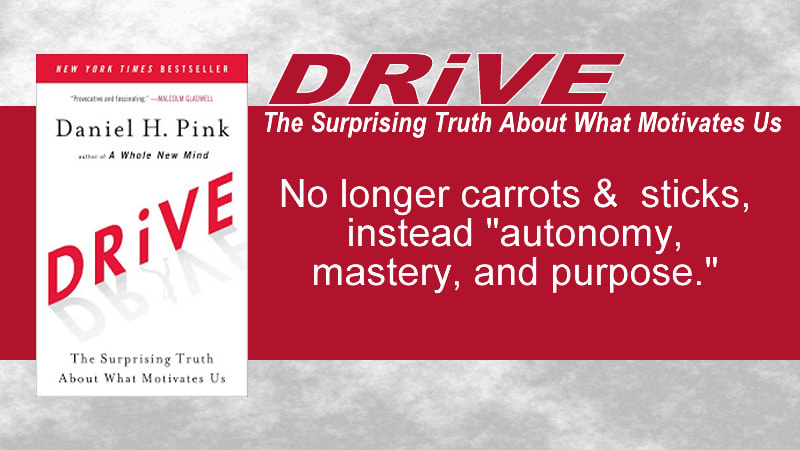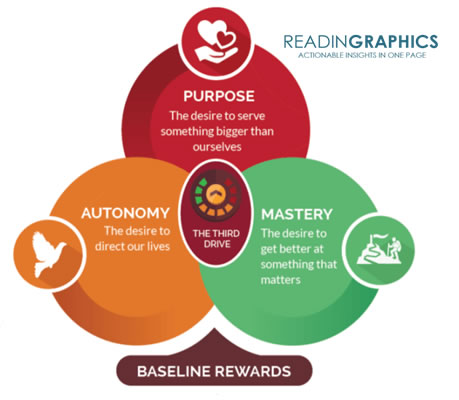There is a general belief that the best way to motivate ourselves and other is with external rewards like money-- the sticks and carrot approach. That's a mistake says Daniel Pink. The secret to high performance and satisfaction-- at home, at school, and at work-- is the deeply human need to direct our own lives, to learn and create new things, and to do better by ourselves and our world.
Drawing on four decades of scientific research on human motivation, Pink exposes the mismatch between what science knows and what business (and education) does—and how that affects every aspect of our lives. He demonstrates that while the old-fashioned carrot-and-stick approach worked successfully in the 20th century, it's precisely the wrong way to motivate people for today's challenges. (from book jacket)
Drawing on four decades of scientific research on human motivation, Pink exposes the mismatch between what science knows and what business (and education) does—and how that affects every aspect of our lives. He demonstrates that while the old-fashioned carrot-and-stick approach worked successfully in the 20th century, it's precisely the wrong way to motivate people for today's challenges. (from book jacket)
Virtual Book Discussion |
Sponsored by WEAC and WEA Academy
https://weaacademy.org/product/drive/ |
DISCUSSION Schedule
|
Part One, March 10, 2021, 6:00 pm
Intro- The puzzling puzzles of Harry Harlow and Edward Deci A New Operating System Chapter 1- The Rise and Fall of Motivation 2.0 Chapter 2- Seven Reasons Why Carrots and Sticks (Often) Don't Work... Chapter 2A- ... and Special Circumstances When They Do Chapter 3- Type I and Type X DRIVE Survey- Are you a Type I or Type X Survey time- about 10 minutes. Part 1 Discussion Questions Part Two, March 31, 2021, 6:00 pm The Three Elements Chapter 4- Autonomy Chapter 5- Mastery Chapter 6- Purpose Part 2 Discussion Questions Part Three, April 21, 2021, 6:00 pm The Type I Toolkit Part 3 Discussion Questions |
Short on time? Forgot what you read?
Refer to "Drive- The Recap," p. 203 in the book, for a quick review of each chapter. Or watch one of the videos linked on this page. How to join the virtual book discussion?
Contact WEA Academy- https://weaacademy.org/product/drive/ Virtual Discussion Tips
Zoom will be used for book discussions. Here are a few tips for a great meeting...
|
To help you connect to Drive
|
Daniel Pink outlines the premise behind what drives us today.
Time- 18 minutes. PART 1, A new operating system
Use this video to connect with the content in Part 1, chapters 1-3.
Time- 10 minutes PART 2, The three elements: autonomy, mastery, purpose
This video reviews the elements of Part 2, chapters 4-6.
Time- 8:28 minutes. PART 3, The Type I Toolkit
Two questions that can change your life. Time- 2 minutes
|
Response from the authorIn preparation for the discussion I contacted Daniel Pink and ask two questions related to education and motivation.
QUESTION: It has been 12 years since the book was published and we still ascribe to old principles on motivation, especially within education. Why do you think this is? DANIEL PINK: Progress is slow for lots of reasons — but two stand out. The first is that teachers — the people who know what motivates students and who understand these principles the best — don’t make policy. Too often the rules and structures imposed by state legislatures don’t allow for movement in this direction described in the book. The second reason is that this approach is harder. Sometimes it’s easier to push for control with rewards and punishments and more severe forms of classroom management. Many teachers are trained to do just that, in fact. And these two reasons converge. Fostering intrinsic motivation is inherently difficult. Doing it in a system that sometimes seem designed to thwart it is harder still. QUESTION: What can we as educators do to make it better? DANIEL PINK: As for what educators can do, one thing I’ve noticed over the years as a student, parent, and observer is that the very best teachers — the teachers students remember decades later — are strategic subversives. They don’t aim to obliterate the entire system. And they don’t try to subvert merely for its own sake. They take small steps in their own classroom to make things better for their students, even if those small steps aren't officially endorsed by the authorities. So, in practice this can mean initiating a genius hour for students or spending less time focused on grades or quickly dispatching with bureaucratic nonsense to move to real learning. If teachers — or anyone really — asks, “Can I change everything?,” the answer is, unfortunately, “No.” But that’s the wrong question. We should all be asking, “Can I do one small thing today in my own realm to make things a little better?” The answer to that is almost away “Yes.” |
"No two persons ever read the same book." Edmund Wilson


